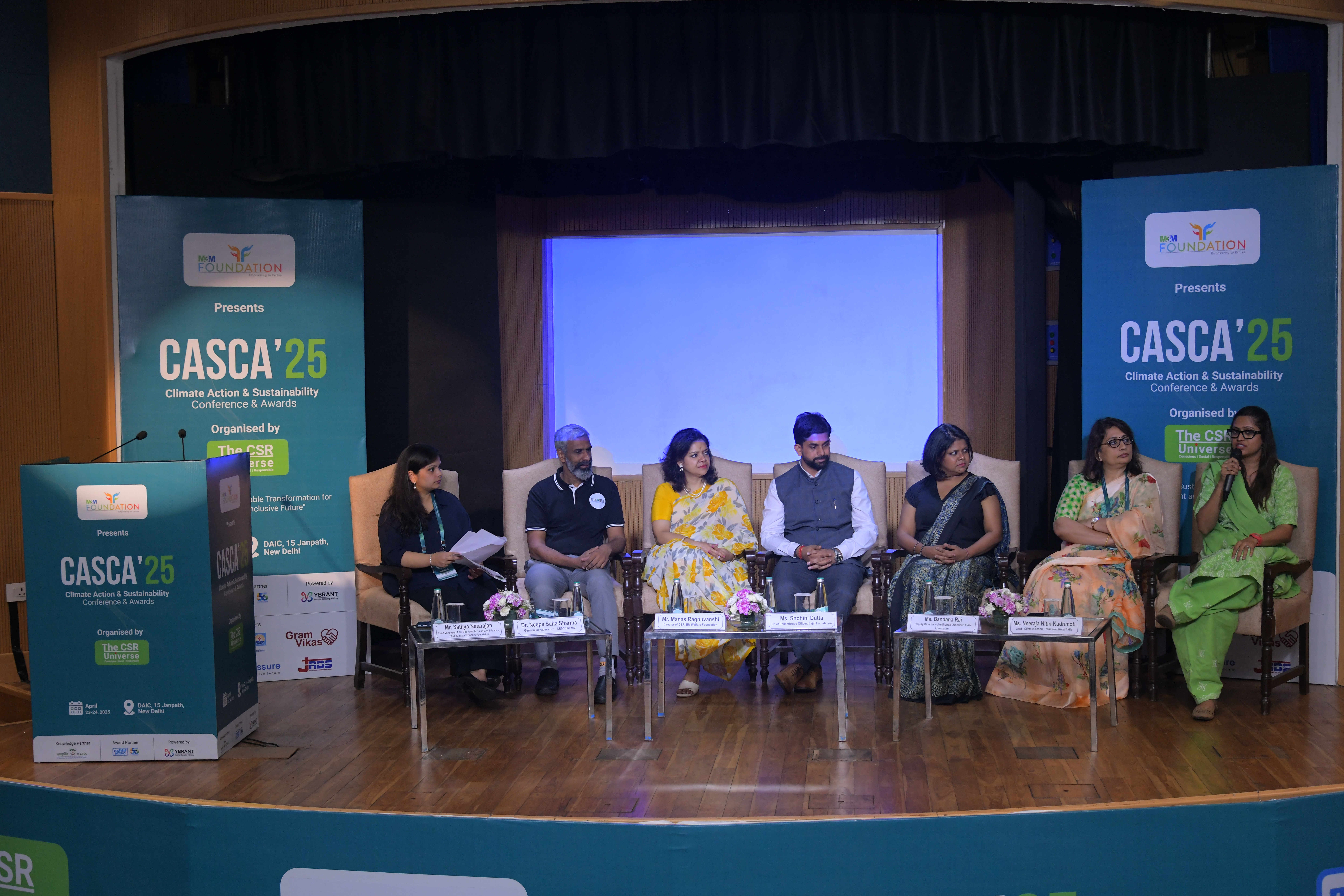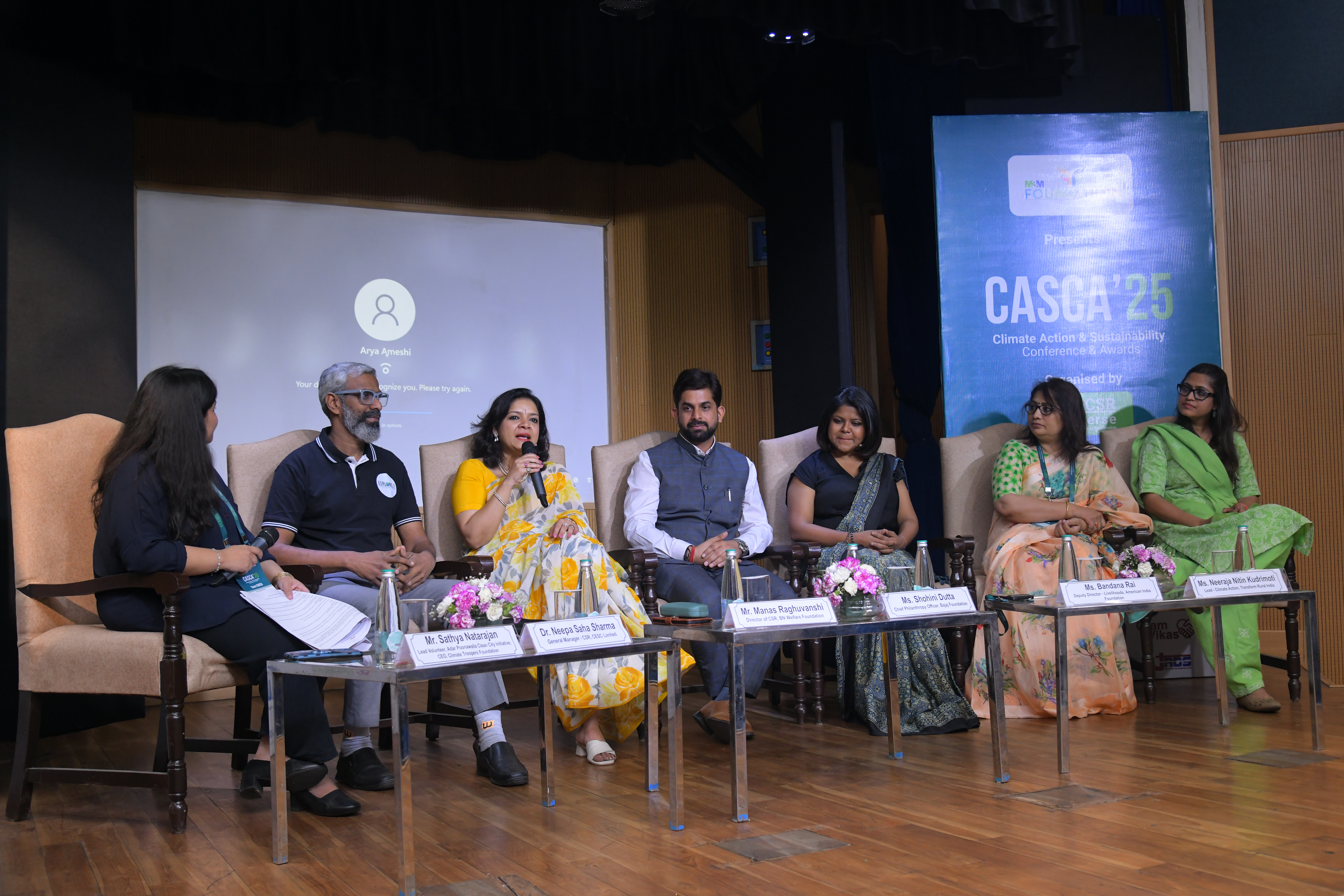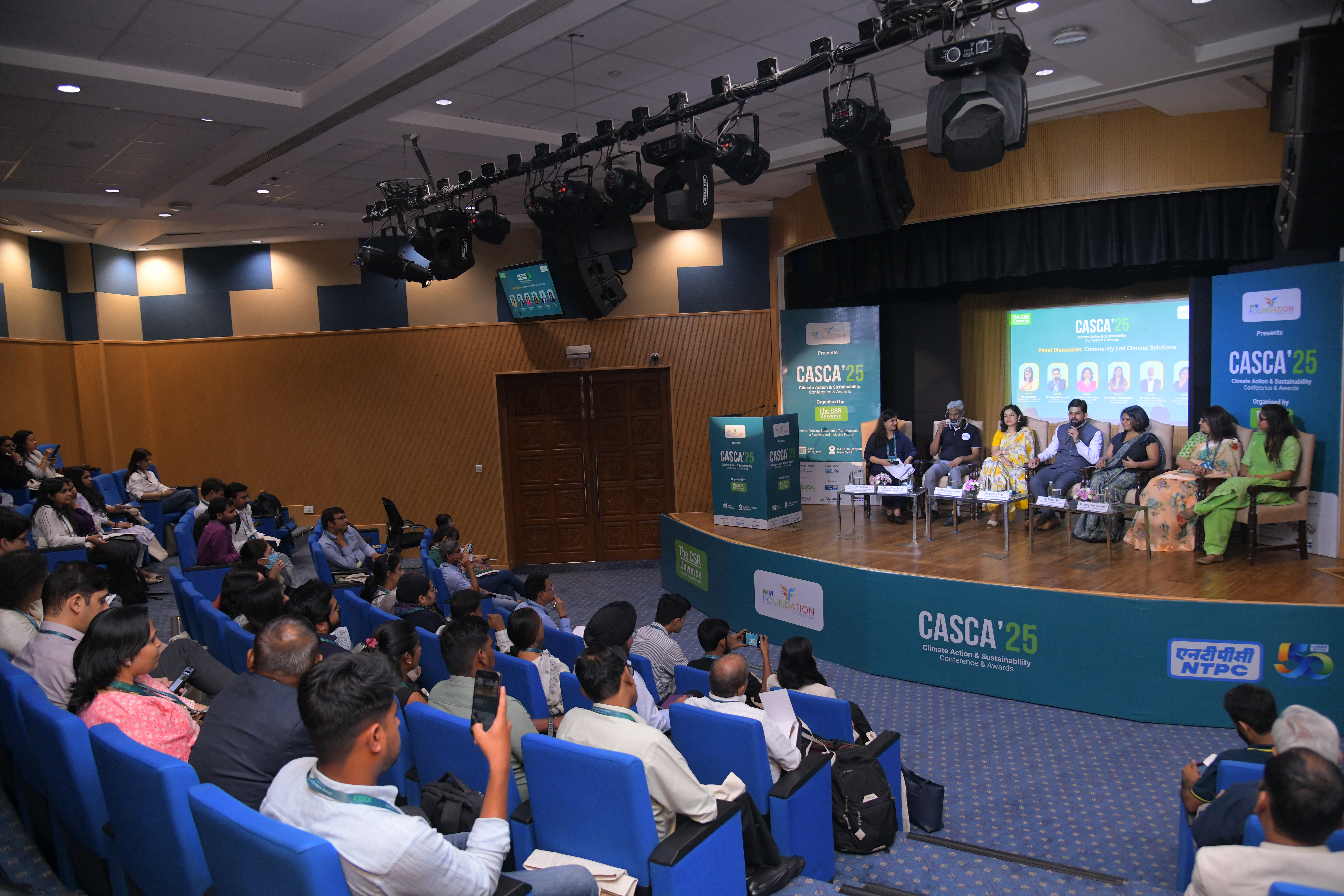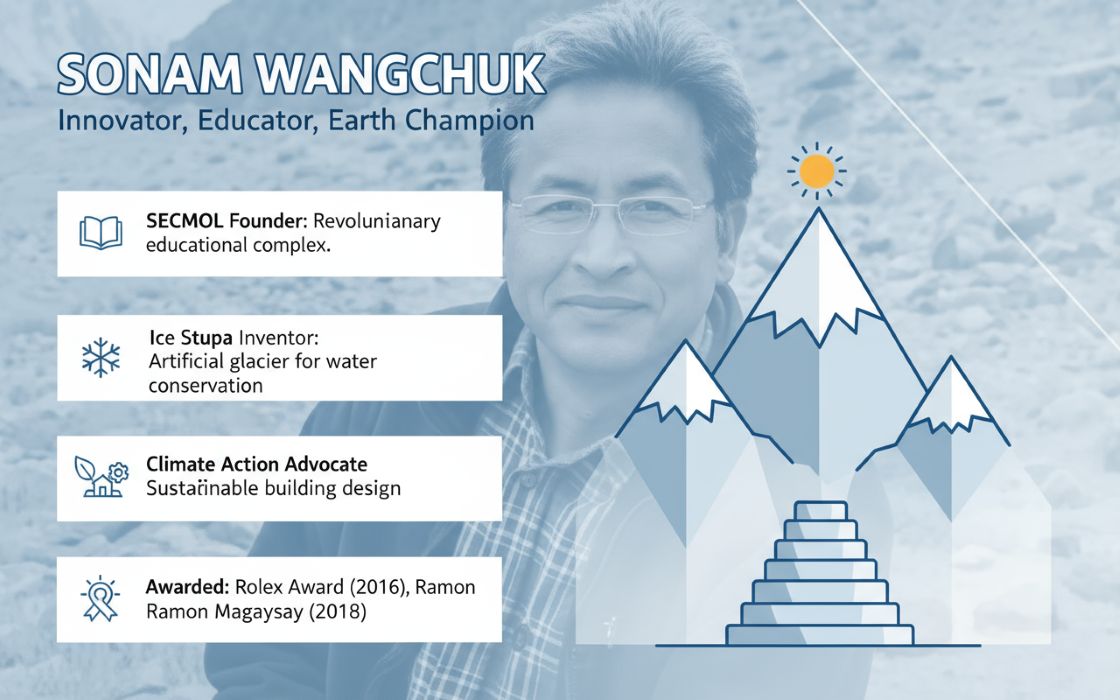As climate change continues to challenge our world, solutions rooted in local communities are emerging as beacons of hope. On Day 1 of CASCA’25, the Climate Action & Sustainability Conference & Awards held at the Dr. Ambedkar International Centre, New Delhi, a panel discussion titled “Community-Led Climate Solutions: Local Action for Global Impact” provided an in-depth exploration of grassroots innovation and local responses to the climate crisis.
Moderated by Ms. Ruchika Kumar, Editor at TheCSRUniverse, the discussion brought together six changemakers who are driving community-based climate solutions across India. Each panelist shared valuable insights into the intersection of local action, sustainability, and community resilience, showcasing the power of collaboration and local knowledge in addressing global challenges. 
The Role of Rural Communities in Climate Action
The discussion kicked off with Ms. Neeraja Nitin Kudrimoti, Lead – Climate Action at Transform Rural India, who set the tone by highlighting the importance of rural communities in climate action. When asked about the role of rural populations in climate solutions, Ms. Kudrimoti emphasized how rural communities are not merely recipients of aid but active agents of transformation. “When we invested in training farmers in sustainable practices—like zero-budget natural farming—it wasn’t just about crops,” she said. “It was about restoring a relationship with nature that had been disrupted.”
She elaborated on how rural communities, with the right training and support, can become leaders in sustainable farming, showing how local knowledge and traditional practices can be leveraged to tackle modern climate issues. She shared examples of how Transform Rural India’s initiatives in zero-budget farming have helped farmers increase yields while reducing environmental harm, creating a sustainable model that benefits both the community and the environment.
Empowering Urban Communities through Civic Action
Mr. Sathya Natrajan, CEO of Climate Troopers Foundation and Lead of the Adar Poonawalla Clean City Initiative, followed by addressing the role of urban communities in climate action. When asked about how urban environments can contribute to sustainable change, Mr. Natrajan shared compelling examples from the clean-up drives his organization conducts. “We saw participation swell when people realized their clean-up drives made their surroundings visibly better. It’s about pride and ownership,” he said.
Mr. Natrajan spoke about how, initially, the Adar Poonawalla Clean City Initiative began with simple clean-up efforts, but over time, these drives evolved into larger, more organized community actions. He explained that by making urban residents take pride in their surroundings, these initiatives have had a lasting impact on public spaces, shifting mindsets and inspiring people to maintain cleaner, greener environments.
Livelihoods, Climate Action, and the Power of Women
The conversation then moved to the intersection of livelihoods and climate action. Ms. Bandana Rai, Deputy Director – Livelihoods at the American India Foundation, explained how linking climate action to economic empowerment can create lasting change. She said, “When communities earn better while adapting to climate-friendly practices, resilience is no longer a concept—it becomes a way of life.”
Her work focuses on integrating sustainable practices with income generation, particularly for marginalized communities. Ms. Rai spoke about how climate-resilient agriculture and clean energy initiatives have provided new economic opportunities for women in rural areas. By tying climate action to livelihoods, she argued, it not only addresses environmental concerns but also strengthens local economies, creating a self-sustaining cycle of resilience. 
Reviving Traditional Knowledge for Modern Climate Solutions
Next, Dr. Neepa Saha Sharma, General Manager – CSR at CESC Limited, spoke about the importance of reviving traditional knowledge in addressing modern-day climate challenges. When asked about how ancient wisdom can be integrated into current climate action, Dr. Sharma shared the story of how her organization has focused on reactivating traditional water conservation techniques. “Check dams, stepwells, community ponds—these are not relics. They are blueprints for resilience in today’s drought-prone districts,” she said.
She emphasized how CESC Limited is bringing back these techniques, which were once common across rural India, to tackle water scarcity in today’s context. According to Dr. Sharma, the revival of these indigenous methods is helping communities build resilience against water shortages and improve their water management systems, ensuring long-term sustainability. She also pointed out that these practices are cost-effective and community-driven, demonstrating that often, the best solutions come from within.
The Importance of Educating the Next Generation
Ms. Shohini Dutta, Chief Philanthropy Officer at the Bajaj Foundation, brought attention to the critical role of education in shaping future climate leaders. “The children we educate today will inherit tomorrow’s climate,” she noted. “Embedding climate thinking into school curricula is one of the most powerful levers we have.”
She explained how the Bajaj Foundation is working with schools to incorporate climate education into their curriculums, helping young students understand the importance of sustainability. Ms. Dutta emphasized that by teaching children about climate change and environmental stewardship, we are fostering a generation that will actively work towards a sustainable future. She gave examples of how the foundation’s initiatives have already started to transform classrooms into spaces where children not only learn about the environment but also engage in practical actions such as tree planting and waste management. 
Collaboration: Unlocking Scalable Climate Solutions
As the discussion progressed, the panelists agreed that no single organization or community can tackle climate change alone. Mr. Manas Raghuvanshi, Director – CSR at BN Welfare Foundation, stressed the importance of collaboration in scaling up grassroots solutions. “We don’t need to reinvent solutions—we need to align efforts,” he said. “When resources and intent come together, we’ve seen real transformation in areas like renewable energy, afforestation, and clean water access.”
Mr. Raghuvanshi described how the BN Welfare Foundation has worked alongside government bodies, corporations, and NGOs to implement renewable energy projects, restore forests, and improve water access in underserved communities. He pointed out that the key to success lies in creating partnerships that bring together the strengths of each stakeholder, whether it's funding, expertise, or community outreach.
Conclusion: A Collective Vision for the Future
Throughout the discussion, the panelists collectively called for an evolution in how grassroots initiatives are supported and scaled. They urged for more flexible funding models, policies that are adaptable to local contexts, and long-term CSR strategies that prioritize community empowerment over quick wins.
As Ms. Kumar concluded the session, she emphasized the message that emerged throughout the conversation: true climate solutions will not come from the top down but from the ground up. The grassroots efforts discussed during the panel exemplified how communities, when given the tools and support, can drive meaningful, scalable change. The panelists highlighted the importance of collaboration, education, and revitalizing traditional knowledge as central pillars in the fight against climate change.
The session at CASCA’25 proved that when local voices and knowledge are given space to thrive, real climate action becomes not just possible, but inevitable.










.jpg)









